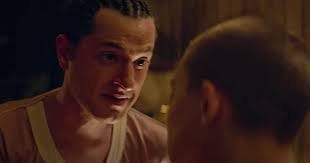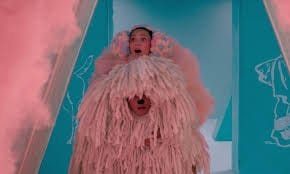In the latest entry in Autism in Entertainment, I Take a Morbid Look Back at Sia's Infamous Music
You don't have to be neurodivergent to be offended, but it sure doesn't hurt!
Astonishingly, Sia’s Music, infamous flop musical, could have been even worse and even more problematic. It was initially not a musical and would have starred Shia LeBeouf or Jonah Hill as a troubled older sibling who must care for their autistic younger sister after their grandmother dies.
Then they gave Sia ten million more dollars to make Music a Musical, and Sia saw a clip of Kate Hudson singing. She decided to radically re-imagine her pet project as a Kate Hudson musical.
There are many things wrong about Music. The biggest might be that it was sold, poorly and inaccurately, as a musical about an autistic girl and her exuberant, colorful inner life. It’s not that movie. Music is, perversely enough, not really about Music, an autistic girl whose life is thrown into turmoil when her grandmother dies and she becomes the custody of her fuck-up older sister.
It’s not about Ebo Odom (Leslie Odom Jr.), the saintly African boxing instructor and unusually pure Magical Negro who kindly, patiently teaches Music’s older sister how to care for Music and also how to be a good person, either.
Music is not about an autistic girl. It’s not about a black man with HIV. It IS, however, about a straight, neurotypical white woman played by a superstar actress whose mom and stepdad are two of the greatest movie stars of all time.
Sia, who claimed to be on the Autism Spectrum after the film was released and eviscerated by the Autism community, seems interested in Music and Ebo primarily, if not exclusively, because they are magical creatures who help a Live Laugh Love type white lady be strong enough to stop using AND selling drugs and not abandon her sister because it’s the easy and convenient thing to do.
Music and Ebo aren’t characters with agency, needs, and desires so much as they’re helpers whose main purpose is to set the attractive, straight white neurotypical woman on the right path.
Music opens with the death of Music’s grandmother and caretaker. Music’s mother is dead, so it falls upon Kazu "Zu" Gamble (Hudson), her older half sister, to look after her.
The briefly sober Zu is more interested in relapsing and getting back into a party lifestyle than in looking after Music. Zu tries to get the state to pick up Music and take her to a care facility. When that proves unsuccessful, she only half-jokes to her neighbor Obo that she plans to drop her off at the aforementioned “People Pound.”
Obo is understandably chagrined to hear Zu talk about a girl he cares for and understands like she’s a misbehaving puppy who isn’t housebroken yet. But he’s not so put off that he doesn’t selflessly teach her how to care for Music.
It doesn’t take long for Zu to fall spectacularly off the wagon and go back to selling drugs for Rudy (Ben Schwartz). Rudy is a drug dealer with cornrows who talks about his abuela, yet he’s played by the wacky funster who voices Sonic the Hedgehog.
Is Schwartz supposed to be Spanish? I don’t know, but the casting is very odd. It’s similar to a heavy scene late in the film where a random dude briefly comes out of his apartment and he’s played by Henry Rollins.
How can anyone NOT be distracted by Henry Rollins just popping up and then disappearing as quickly and inexplicably as he appeared? That is not even the most distracting cameo in the movie.
That would belong to Sia herself. The co-writer/director pops up as herself as one of Zu’s high roller clients. Zu says she’s buying as many painkillers as possible so that she can distribute them to people who are suffering in the third world as sort of a “Pop Stars Without Borders” deal.
Is she joking? Is the film joking? If she is joking, is the joke that she’s on a crazy amount of drugs or that she’s a selfless humanitarian? I have no idea. What I do know is that seeing Sia show up in Sia’s movie as either a saint or a drug fiend is every bit as distracting as the notorious moment in Fred Durst’s The Fanatic where the hero asks his son if he wants to listen to Limp Bizkit in the car.
It’s hard to tell what Sia was going for because the tone shifts wildly. You might think, for example, that playing a drug addict and a drug dealer with a dead mother and a dead grandmother would require a certain gravitas.
Yet Hudson inexplicably delivers the same cheerful, upbeat, “You gotta love me” romantic comedy turn she’d give in a movie pairing her again with Matthew McConaughey.
Musical sequences that suggest what the music videos of Michel Gondry and Spike Jonze might look and feel like if they did not possess any talent have a decidedly different tone than the rest of the film.
These musical set-pieces are initially supposed to represent Music’s inner life and fantasies. But it isn’t long until other characters, particularly Zu and Obo, begin dominating them.
Music maddeningly is not the star of Music. Even more bewilderingly, she’s not even the star of her own fantasies. I don’t want to be overly harsh on Ziegler because she was a child when she made Music, but her performance is distressingly one-note. She’s either grinning big and sashaying happily through life or melting down. There’s no in-between, but the movie does not seem terribly interested in her after a certain point.
In a key bit of dialogue, Obo tells Zu that being Autistic, Music won’t change because she can’t change. It’s a problematic sentiment that also speaks to the film’s not-so-hidden agenda: Music doesn’t change, so the film has no real interest in her. Obo doesn’t have to change because he is perfect. The person who can change and must change is, again, the kind of character you see in lots of movies that have nothing to do with Autism.
Sia shot Music in 2017, then spent three years editing it. Yet it is full of bizarre, inexplicable choices and moments begging for the cutting room floor. For example, one of the beneficiaries of Obo’s kindness is murdered by his abusive father.
The young man is barely in the movie, but after he dies, he starts popping up in Music’s fantasies and in the film’s musical sequences, which are its raison d’être and something that could be cut without hurting the film.
As the autistic father of two Autistic boys as well as a film writer, Music offended me on multiple levels. Sia’s heart was unmistakably in the right place. If she’d made this movie in 1995, she’d probably be heralded for having an autistic character in a central role. We’ve come a long way since then, however.
Representation is no longer enough. Good intentions are no longer enough. A movie like Music needs to walk a fine line, and Sia’s peppy dud staggers confusedly and ends up someplace deeply embarrassing and at least moderately offensive.











The relationship between Sia and Ziegler is so creepy. Sia treats Ziegler in a way not dissimilar from how Michael Jackson treated a lot of kids who came to Neverland Ranch. And it’s been going on for years. Ziegler broke down in tears on the first day shooting Music because she thought autistic people would think she was making fun of them. Sia told her it was okay and to keep doing it. Ziegler is an innocent and Sia is a weird creep.
Not since STAR TREK: THE NEXT GENERATION's "The Outcast", or GARTH MARENGHI'S DARKPLACE's "Scotch Mist", has there been a project so miscalculated and ham-fisted that it accomplished the exact opposite of what it alleged it was about.
Okay, "Scotch Mist" is a lampoon of those kinds of movies and television shows, but it's so perfectly one I had to include it anyway.